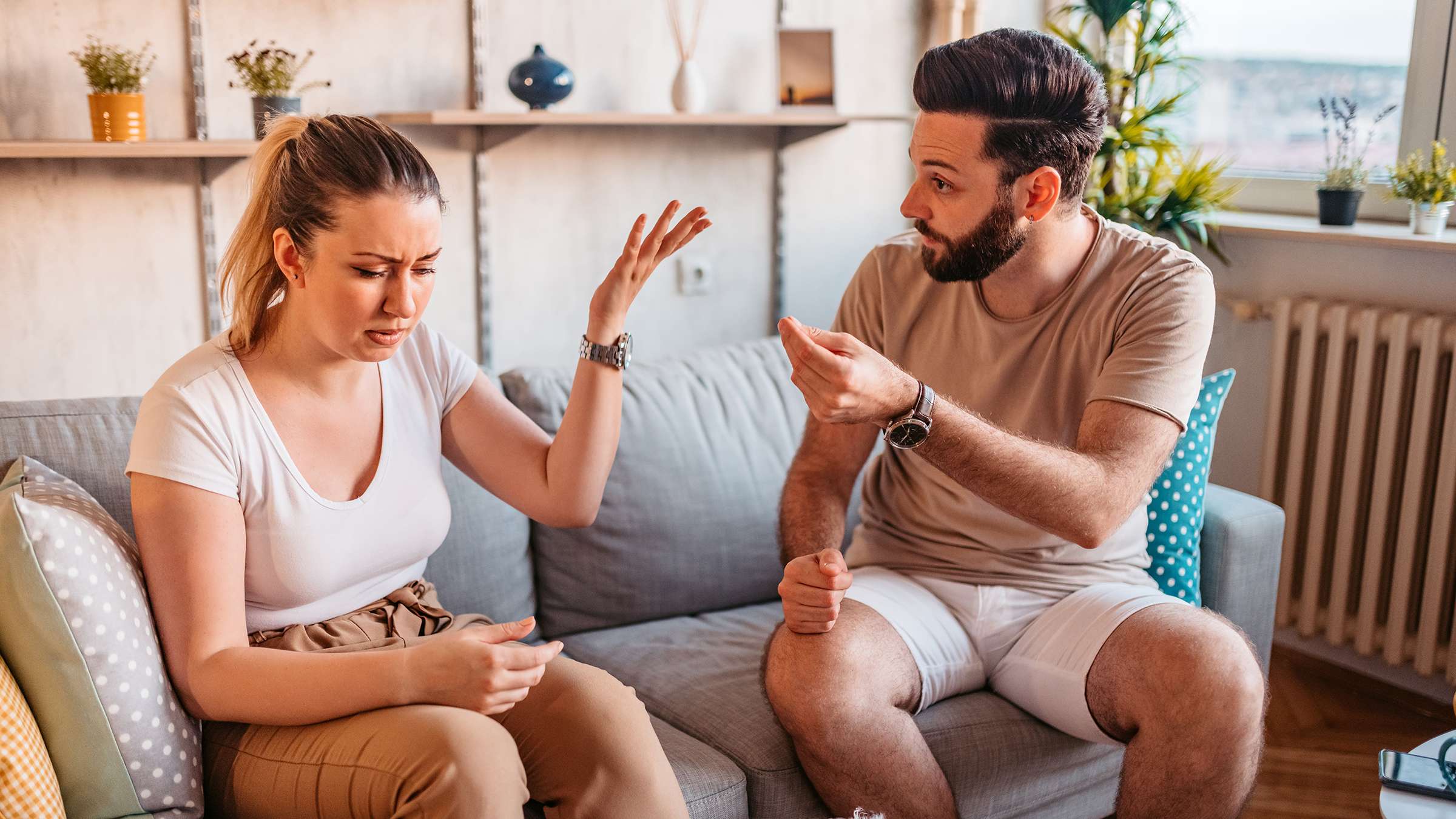Most people feel anxious or scared sometimes, but if it’s affecting your life there are things you can try that may help.
Support is also available if you’re finding it hard to cope with anxiety, fear or panic.
Symptoms of anxiety
Anxiety can cause many different symptoms. It might affect how you feel physically, mentally and how you behave.
It’s not always easy to recognise when anxiety is the reason you’re feeling or acting differently.
Physical symptoms
- faster, irregular or more noticeable heartbeat
- feeling lightheaded and dizzy
- headaches
- chest pains
- loss of appetite
- sweating
- breathlessness
- feeling hot
- shaking
Mental symptoms
- feeling tense or nervous
- being unable to relax
- worrying about the past or future
- feeling tearful
- not being able to sleep
- difficulty concentrating
- fear of the worst happening
- intrusive traumatic memories
- obsessive thoughts
Changes in behaviour
- not being able to enjoy your leisure time
- difficulty looking after yourself
- struggling to form or maintain relationships
- worried about trying new things
- avoiding places and situations that create anxiety
- compulsive behaviour, such as constantly checking things
Symptoms of a panic attack
If you experience sudden, intense anxiety and fear, it might be the symptoms of a panic attack. Other symptoms may include:
- a racing heartbeat
- feeling faint, dizzy or lightheaded
- feeling that you’re losing control
- sweating, trembling or shaking
- shortness of breath or breathing very quickly
- a tingling in your fingers or lips
- feeling sick (nausea)
A panic attack usually lasts 5 to 30 minutes. They can be frightening, but they’re not dangerous and should not harm you.
Where to get NHS help for anxiety, fear and panic
Referring yourself for therapy
If you need more support, you can get free talking therapies like cognitive behavioural therapy (CBT) on the NHS.
You can refer yourself directly to an NHS talking therapies service without a referral from a GP.
Find an NHS talking therapies service
Non-urgent advice:
See a GP if:
- you’re struggling to cope with anxiety, fear or panic
- things you’re trying yourself are not helping
- you would prefer to get a referral from a GP
Urgent advice:
Ask for an urgent GP appointment or call 111 if:
- you need help urgently, but it’s not an emergency
111 can tell you the right place to get help if you need to see someone. Go to NHS 111 online or call 111.
Immediate action required:
Call 999 or go to A&E now if:
- you or someone you know needs immediate help
- you have seriously harmed yourself – for example, by taking a drug overdose
A mental health emergency should be taken as seriously as a medical emergency.
Find your nearest A&E
Causes of anxiety, fear and panic
There are many different causes of anxiety, fear or panic and it’s different for everyone.
When you’re feeling anxious or scared, your body releases stress hormones, such as adrenaline and cortisol.
This can be helpful in some situations, but it might also cause physical symptoms such as an increased heart rate and increased sweating. In some people, it might cause a panic attack.
Regular anxiety, fear or panic can also be the main symptom of several health conditions. Do not self-diagnose – speak to a GP if you’re worried about how you’re feeling.
Identifying the cause
If you know what’s causing anxiety, fear or panic, it might be easier to find ways to manage it.
Some examples of possible causes include:
- work – feeling pressure at work, unemployment or retirement
- family – relationship difficulties, divorce or caring for someone
- financial problems – unexpected bills or borrowing money
- health – illness, injury or losing someone (bereavement)
- difficult past experiences – bullying, abuse or neglect
Even significant life events such as buying a house, having a baby or planning a wedding could lead to feelings of stress and anxiety.
You might find it hard to explain to people why you feel this way, but talking to someone could help you find a solution.
Find out more about the 5 steps to mental wellbeing.
Conditions related to anxiety, fear and panic
A table showing some of the conditions related to anxiety, fear and panic Symptoms Possible cause feelings of anxiety that will not go away, anxiety is affecting your life generalised anxiety disorder overwhelming fear of something specific like an object, place or animal phobias regularly experiencing panic attacks panic disorder often reliving traumatic past experiences, nightmares and flashbacks post-traumatic stress disorder 
Source: Big Stock Images
Like all emotions, anxiety is healthy, and we’re all prone to feeling it sometimes. Anxiety can become a debilitating problem, though, when the stress you feel is no longer in proportion to the situation. An upcoming test, job interview, or first date may make you feel anxious, and that’s healthy. But if you feel symptoms of anxiety absent any apparent reason, or everyday things make you anxious—leaving your home, for example—it may be time to see a mental health professional. To know if your anxiety is unmanageable, you have to know the symptoms.
1. Physical Symptoms
The physical symptoms of anxiety may include an upset stomach, excessive sweating, headache, rapid heartbeat, and trouble breathing. If you get a stomachache every time someone invites you to a social function; if you sweat through your shirt whenever you leave the house, even in the middle of winter; or if you feel like your heart is beating so fast it might burst when talking to a stranger on the phone, you may be unhealthily anxious. If your body regularly reacts to everyday stressors the way a caveman would if a lion chased him, your anxiety is no longer healthy.
2. Cognitive Symptoms
Memory issues, trouble concentrating, and insomnia are also symptoms of an anxiety problem. If you can’t fall asleep or wake up repeatedly during the night, because you can’t stop thinking about things that stress you out, anxiousness is ruling over you. The same goes if you can’t focus on work, or sit through a movie, or read a book, or if you seem to be continually forgetting things that happened even recently. When you’re severely anxious about something, even if the thing is “irrational,” it can be hard to function normally.
3. Procrastination and Avoidance
Whether it’s procrastinating about doing the thing that triggers your anxiety—like putting off an errand or not reading an important email until you’re “ready to deal with it”—or avoiding doing just about everything, excessive procrastination and avoidance are both signs of an anxiety issue. We all put off starting unpleasant or difficult tasks sometimes, but when you spend more time avoiding than doing, it may be time to seek outside help.
4. Overthinking and Constant Worrying
If worrying keeps you from functioning or you’re overthinking so much that you can’t focus on important work or sleep at night, you may have an anxiety problem. Your mind races, you lose track of your surroundings, and you’re so caught up in a storm of stressful thoughts that you miss your freeway exit. Anxiety tips over from healthy to unhealthy when it disrupts your life. If a recent health diagnosis has you worried, that’s totally normal. If you’re afraid that you’re dying every time you sneeze, that’s not.
5. Feeling Agitated and Restless
If you feel on edge, you can’t stop moving, and you’re quick to anger, you may be anxious. I’ve written before about how anger can disguise itself as anxiety, but did you know that anxiety can also disguise itself as anger? Anger can be a way to shield you from stressful thoughts. By raging at someone else, you can blame your anxious feelings on an outside force. And if you’re always moving, you don’t have time to ruminate on anxious thoughts. But neither response is healthy or helpful in the long term. When you feel agitated and restless more often than not, when you can’t stop moving and get easily annoyed or are prone to snap at people, you may have a serious problem with anxiety.
6. Panic Attacks
Often, people mistake a panic attack for a heart attack. Tightness in your chest, rapid heartbeat, sweating and shaking, shortness of breath, and an upset stomach can easily be mistaken for a heart attack. It’s important to know the symptoms of a heart attack so that you don’t dismiss one by thinking it’s a panic attack, or do the opposite and call 911 when you should call a psychologist. Frequent panic attacks are a sign you may have a panic disorder.
To differentiate between healthy and unhealthy anxiety, ask yourself: Is this manageable? If your anxiety keeps you from sleeping, working, social interactions, or errands, you may want to reach out to a therapist. If you feel anxious for more than half the week for six months or longer, it’s probably time to seek help.
To find a therapist near you, visit the Psychology Today Therapy Directory.
Facebook Image Credit: Johan Larson/Shutterstock
LinkedIn Image Credit: Sjale/Shutterstock
We include products we think are useful for our readers. If you buy through links on this page, we may earn a small commission. Here’s our process.
Healthline only shows you brands and products that we stand behind.
Our team thoroughly researches and evaluates the recommendations we make on our site. To establish that the product manufacturers addressed safety and efficacy standards, we:
- Evaluate ingredients and composition: Do they have the potential to cause harm?
- Fact-check all health claims: Do they align with the current body of scientific evidence?
- Assess the brand: Does it operate with integrity and adhere to industry best practices?
We do the research so you can find trusted products for your health and wellness.
Read more about our vetting process.
If you deal with anxiety, there are strategies you can use to avoid feeling consumed by it. Here are some quick solutions to help you address the situation immediately, as well as long-term methods to combat a recurring issue.
Breathe: There are ways to calm your anxiety
Know that feeling of your heart beating faster in response to a stressful situation? Or perhaps, your palms get sweaty when you’re confronted with an overwhelming task or event.
That’s anxiety — our body’s natural response to stress.
If you haven’t recognized your triggers yet, here are a few common ones: your first day at a new job, meeting your partner’s family, or giving a presentation in front of a lot of people. Everyone has different triggers, and identifying them is one of the most important steps to coping with and managing anxiety attacks.
Identifying your triggers can take some time and self-reflection. In the meantime, there are things you can do to try to help calm or quiet your anxiety from taking over.
5 quick ways to cope with anxiety
If your anxiety is sporadic and getting in the way of your focus or tasks, there are some quick natural remedies that could help you take control of the situation.
If your anxiety is focused around a situation, such as being worried about an upcoming event, you may notice the symptoms are short-lived and usually subside after the anticipated event takes place.
1. Question your thought pattern
Negative thoughts can take root in your mind and distort the severity of the situation. One way is to challenge your fears, ask if they’re true, and see where you can take back control.
2. Practice focused, deep breathing
Try breathing in for 4 counts and breathing out for 4 counts for 5 minutes total. By evening out your breath, you’ll slow your heart rate which should help calm you down.
The 4-7-8 technique is also known to help anxiety.
3. Use aromatherapy
Whether they’re in essential oil form, incense, or a candle, natural scents like lavender, chamomile, and sandalwood can be very soothing.
Aromatherapy is thought to help activate certain receptors in your brain, potentially easing anxiety.
4. Go for a walk or do 15 minutes of yoga
Sometimes, the best way to stop anxious thoughts is to walk away from the situation. Taking some time to focus on your body and not your mind may help relieve your anxiety.
Getting some quick exercise can help boost your mood and calm your mind.
5. Write down your thoughts
Writing down what’s making you anxious gets it out of your head and can make it less daunting.
These relaxation tricks are particularly helpful for those who experience anxiety sporadically. They may also work well with someone who has generalized anxiety disorder (GAD) when they’re in a bind!
However, if you suspect you have GAD, quick coping methods shouldn’t be the only kind of treatment you employ. You’ll want to find long-term strategies to help lessen the severity of symptoms and even prevent them from happening.
When is my anxiety harmful?
Identifying what sort of anxiety you’re dealing with can be somewhat challenging because how one’s body reacts to perceived danger can be entirely different compared to another person.
It’s likely you heard anxiety as a blanket term for that general feeling of worry, nervousness, or unease. It’s often a feeling in response to an upcoming event that has an uncertain outcome.
Every person deals with it at one time or another, because it’s part of our brain’s response to a perceived danger — even if that danger isn’t real.
That said, there are times anxiety can get serious and turn into anxiety attacks that initially feel manageable and then gradually build up over a few hours. (This is different from a panic attack, which is out of the blue and subsides.)
Signs of an anxiety attack
These are some of the more common mental and physical symptoms of anxiety:
- feelings of danger, panic, or dread
- nervousness or restlessness
- rapid heart rate
- sweating
- trembling or chills
- tiredness or weakness
- gastrointestinal problems
- difficulty focusing
- hyperventilation
It’s also possible to experience an anxiety and panic attack simultaneously. The quick coping strategies mentioned above may also help with a panic attack.
Other mindful strategies to cope with panic attacks include focusing on an object, repeating a mantra, closing your eyes, and going to your “happy” place.
Symptoms of a panic attack
- fear of dying
- feeling like you’re losing control
- a sense of detachment
- heart palpitations
- shortness of breath
- chest pains or tightness
- nausea
- feeling lightheaded or dizzy
- numbness or tingling in your extremities
- feeling hot or cold
If you notice that quick tips haven’t been working, you may want to consider seeing a professional for help. Especially if you believe you have GAD and it’s interfering with routine activities and causing physical symptoms.
A mental health professional can help with streamlining the process of identifying your triggers, maintaining long-term strategies through behavioral therapy, medications, and more.
Anxiety may always be a part of your life, but it shouldn’t overtake your day-to-day. Even the most extreme anxiety disorders can be treated so that the symptoms aren’t overwhelming.
Once you find what treatment works best for you, life should be a lot more enjoyable and a lot less daunting.
Read this article in Spanish.



